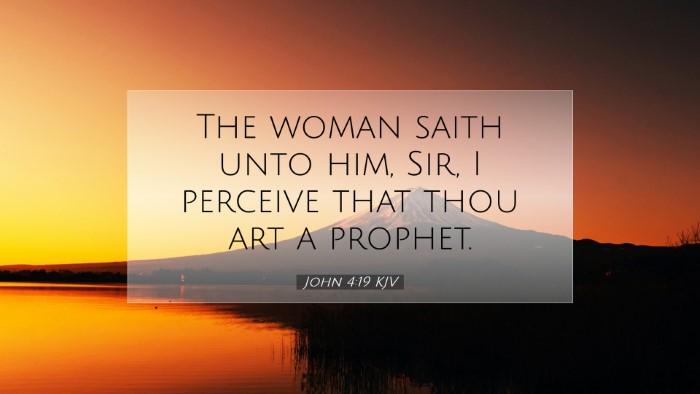Commentary on John 4:19
Text of John 4:19 (KJV): "The woman saith unto him, Sir, I perceive that thou art a prophet."
Introduction
The passage of John 4:19 is a pivotal moment in the interaction between Jesus and the Samaritan woman at the well. It serves as a turning point that reveals the woman's growing awareness of Jesus' identity and sets the stage for a deeper theological discourse about worship and truth. This commentary will synthesize insights from Matthew Henry, Albert Barnes, and Adam Clarke, connecting their interpretations to provide a comprehensive understanding of the significance of this verse.
Contextual Background
In this chapter, Jesus travels through Samaria and stops at Jacob's well, where he encounters a Samaritan woman. Their conversation addresses various themes, including social barriers, spiritual thirst, and true worship. The woman’s statement in verse 19 reflects her response to Jesus’ knowledge of her past, illustrating a mix of astonishment and recognition of His prophetic insight.
Analysis of the Verse
Recognition of Prophetic Identity
The acknowledgment by the woman that Jesus is a prophet is significant. As Matthew Henry notes, this recognition comes after Jesus reveals intimate details about her life that no ordinary man could know (John 4:17-18). This moment signifies the beginning of her spiritual enlightenment and acceptance of Jesus’ authority. She perceives an extraordinary insight, indicating a burgeoning faith.
Spiritual Insight and Awareness
Albert Barnes emphasizes the importance of the woman's statement as it reflects her developing understanding of who Jesus is. Initially, she engages with Jesus on a purely superficial level, but His revelation prompts her to acknowledge His prophetic role. This shift illustrates the process of moving from disbelief to recognition, a theme prevalent in the Gospel of John.
Gender and Social Implications
This encounter also highlights profound social implications. As Adam Clarke points out, the woman’s recognition of Jesus as a prophet challenges the prevailing norms of gender and ethnicity. Jesus, a Jewish man, engages with a Samaritan woman, crossing cultural boundaries. Her acknowledgment of Him as a prophet signifies the breaking down of these barriers, highlighting the Gospel's universal message.
Theological Implications
- Revelation and Faith: The woman's recognition of Jesus as a prophet prompts deeper theological questions. Matthew Henry asserts that recognition leads to inquiry, suggesting that true revelation must elicit a response of faith and curiosity.
- Worship in Spirit and Truth: Following this verse, the conversation transitions into themes of worship (John 4:21-24). Albert Barnes argues that this interaction prepares the ground for Jesus to introduce revolutionary ideas about worship transcending traditional locations and rituals.
- God's Inclusivity: Adam Clarke highlights that the woman’s recognition opens a dialogue that signifies God's inclusivity. The Gospel reaches beyond conventional boundaries, inviting all to partake in the blessings of salvation.
Historical Interpretations
The early church fathers and other theologians have interpreted this verse through various lenses. Some see it as a profound moment of revelation, where the woman represents mankind's recognition of divine insight. Matthew Henry emphasizes the need for humility in accepting God’s truth, while Albert Barnes focuses on the transformative power of Jesus' words.
Application for Pastors and Theologians
This passage invites pastors and theologians to reflect on the following themes:
- Encouragement for Evangelism: The woman’s transformation following her encounter with Jesus illustrates the potential for others to experience similar revelations. Pastoral ministries should cultivate environments where individuals feel comfortable seeking answers and discovering truth.
- Cultural Sensitivity: Jesus’ approach emphasizes the importance of cultural awareness and sensitivity in ministry work. It challenges pastors to engage with diverse communities meaningfully.
- Promoting Genuine Worship: Understanding worship as an act of engaging with God in spirit and truth is essential for the life of the church. Theological leaders must teach congregations about the heart of worship being relational rather than merely ritualistic.
Conclusion
John 4:19 serves as a critical moment of revelation that reveals both the identity of Jesus as a prophet and marks the beginning of a profound transformation for the Samaritan woman. Through the insights of Matthew Henry, Albert Barnes, and Adam Clarke, we see significant theological, social, and spiritual implications that resonate with contemporary audiences. This verse challenges us to pursue deeper engagement with Jesus, recognize His authority in our lives, and embrace the call to true worship.


